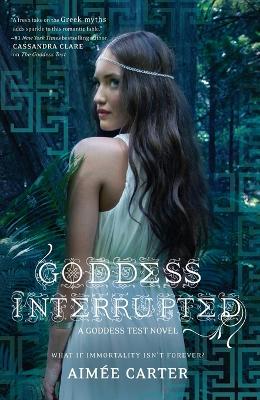Reviewed by Rinn on
I was really excited for this book, and was sadly rather disappointed by it. I absolutely love Greek mythology, so any book involving it - especially an interesting modern take on it - is a must read for me. But I think it was actually my love of and interest in Greek mythology that ruined this one for me.
Firstly, it took me a while to work out which god/goddess was which. I just had to know who was who, whereas for some readers that might not be such a concern. They all have modern names, and whilst some of them have names starting with the same letter as their Greek counterparts, others seem completely random. Not to mention naming Demeter Diana, which is the Roman name for Artemis - plus some characters, such as Adonis, still had their Greek names. I really wish there had been a guide to the gods - which there was, at the very back, so hard to spot on the Kindle version! It would've been much better to put that right at the start. I did manage to identify all the gods though, through both their powers/attributes, and then by process of elimination... (i.e. Sofia being one of the 'big six', and she isn't Hera or Demeter, so she must be Vestia).
I think the only reason I managed to work out who was who is because I have read and studied so much about Greek mythology - there really wasn't much to set them apart, and they didn't seem very 'god like' to me.
Also, if you know anything about Greek mythology, you should know: never trust the gods. They're scheming, selfish and see humans as their playthings. And have a penchant for incest... Carter tries to get around this by explaining that although the gods are all a big (not so happy) family, family is a very loose term. They're not related by blood, but they don't have another word to explain how close they are. Yet at some moments the book seems to claim X is related to Y etc, and others they're not. I can understand it would be a tricky thing to get around, since incest is not exactly a topic you'd want to cover in a book like this, but Carter just doesn't quite pull off the 'not family' thing. Theo and Ella's (Apollo and Artemis) relationship was a bit odd. They're twins, yet they seemed like a couple - or maybe they weren't actually related in the book? I can't tell!
Plus - the idea that Henry (Hades) is a virgin?! He's a god. Hades stole Persephone away, then tricked her into eating pomegranate seeds so she had to stay in the Underworld during autumn and winter. I'm sorry, but I can't see a guy like that still being a virgin. There are so many legends where various gods (and occasionally goddesses) rape humans, or trick them into having sex by transforming into their husbands or partners (that's how Heracles was born - Zeus transformed into his mother's husband and slept with her).
The main villain was Calliope (Hera) along with Cronus - and she did some very uncharacteristic things. Hera was the goddess of marriage and fertility, and despite all of Zeus' philandering, she remained loyal. Yet in this story she is anything but.
Honestly though, despite all my moaning about the gods and the mythology, the story was well-written, flowed nicely and had none of the usual annoying Young Adult traits (apart from the occasional moaning on Kate's part, but it wasn't too much). The story is nicely paced, with some slower chapters that reveal more about the characters, and a couple of action-packed scenes. Overall, I think the mythology part ruined it for me, which is a real shame. If the book appeals to you, go ahead and read it - but if you have an in-depth knowledge of Greek mythology, some parts may make it a more difficult read.
I would recommend it for anyone who enjoys Young Adult novels, and is bored of the usual vampires/werewolves etc. Aimee Carter has come up with a fun, exciting twist on the usual supernatural YA novels, and I can't fault her writing.
Reading updates
- Started reading
- 25 October, 2012: Finished reading
- 25 October, 2012: Reviewed
